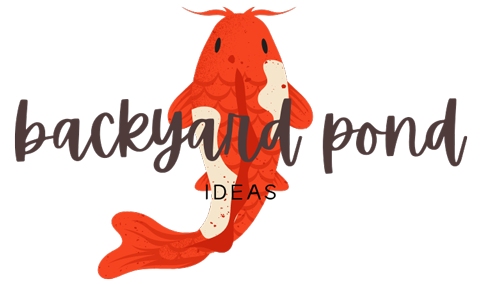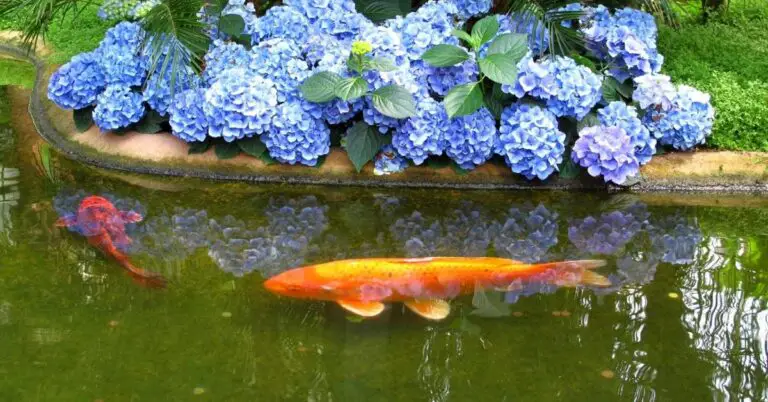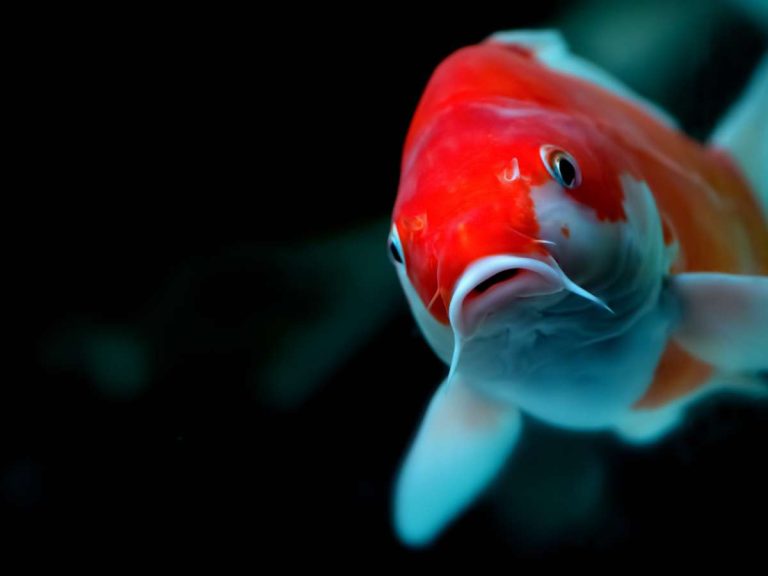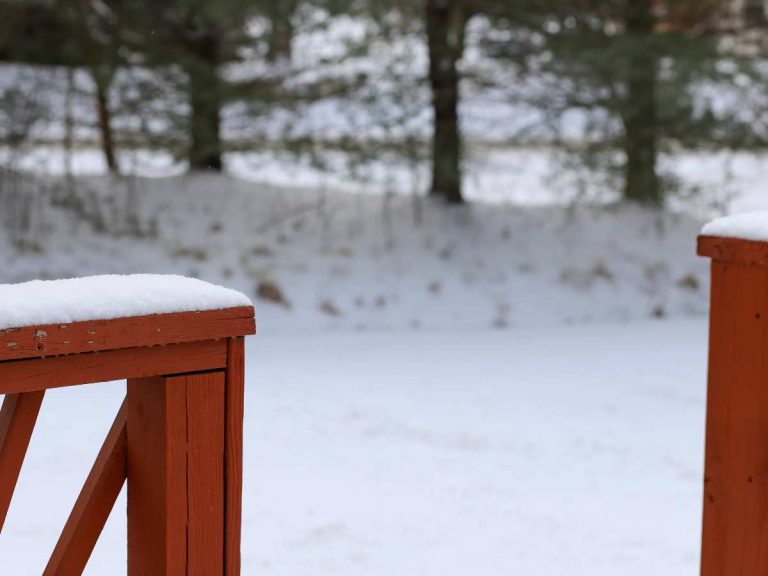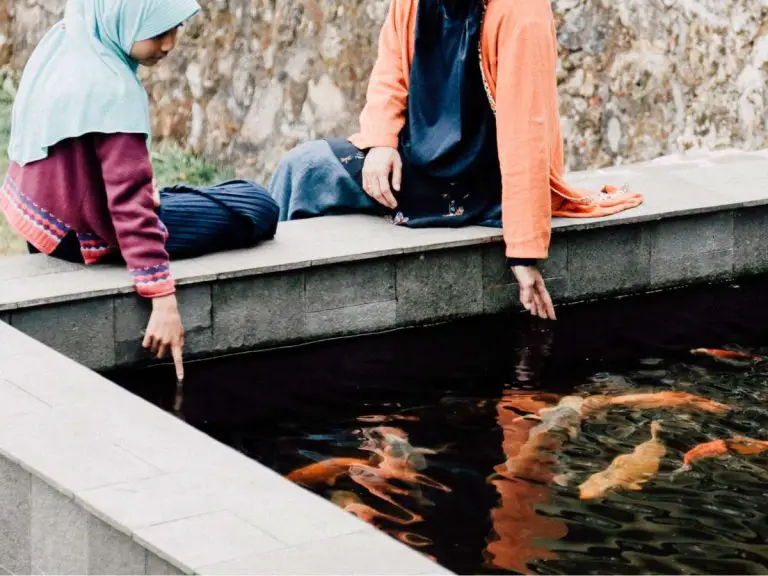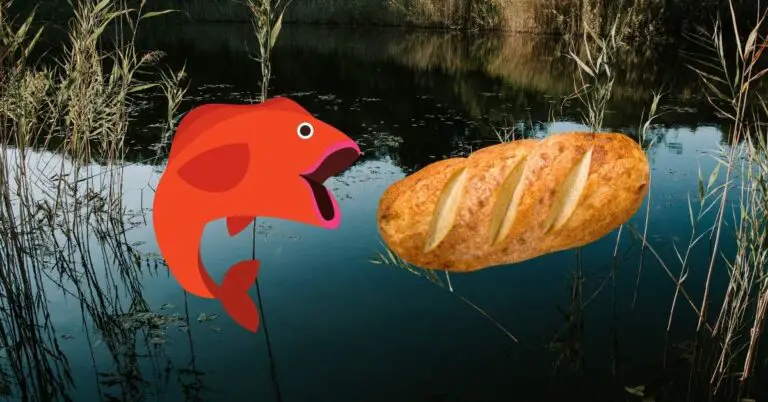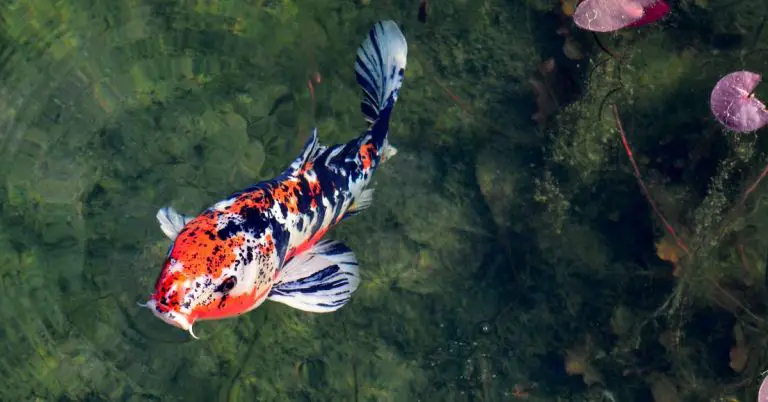What Do Koi Eat in the Wild? Koi’s Natural Diet, and How To Replicate It
So, if you’re a koi owner looking to provide a balanced and appropriate diet for your finned friends, or if you’re thinking about introducing koi fish to an outdoor environment and want to know what kind of food they’ll find in the wild, keep reading.
Koi fish are classified as omnivorous, which means they have a diverse diet in the wild. They enjoy eating a variety of food sources, including aquatic plants and algae, insects and small invertebrates, and even small fish, their eggs, and tadpoles. It’s important to understand their natural diet so that we can replicate it in captivity and ensure their optimal health and well-being.
Stay tuned to discover the specific food sources for koi fish in the wild and learn about the nutritional benefits they provide. By the end of this article, you’ll have a better understanding of what koi fish eat in their native environment and how to provide a natural diet for these beautiful creatures.
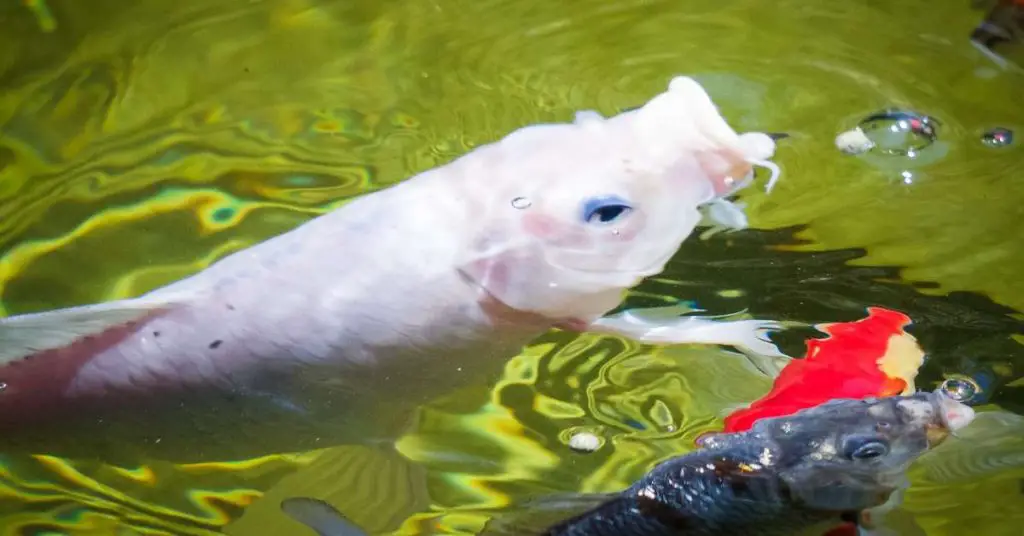
What Koi Eat In The Wild: The Omnivore Diet
| Food Type | Examples | Nutritional Benefits | Notes |
|---|---|---|---|
| Small Fish | Guppies, Minnows, Mosquito fish, Goldfish | Rich in proteins and essential fatty acids. Provides energy and supports growth. | Koi will consume smaller fish that fit in their mouths. |
| Insects & Larvae | Dragonfly larvae, Water beetles, Worms | High in protein. Aids in muscle development and overall growth. | Koi are opportunistic feeders and will eat various insects and larvae found in their habitat. |
| Aquatic Plants | Water lilies, Water hyacinths, Duckweed | Source of carbohydrates, fiber, vitamins, and minerals. Supports digestion and provides essential nutrients. | While koi are omnivores, they do enjoy nibbling on various aquatic plants. |
| Eggs | Fish eggs, Amphibian eggs, Snail eggs | Packed with proteins and fats. Essential for energy and growth. | Koi may consume eggs of other species found in their environment, including their own kind. |
| Algae & Plankton | Green algae, Blue-green algae, Phytoplankton | Source of vitamins and minerals. Aids in digestion and provides a balanced diet. | Algae and plankton are readily available in most freshwater habitats and are consumed by koi. |
Koi’s Natural Diet Explained
Koi fish have developed a feeding strategy that allows them to consume a wide variety of food to meet their nutritional needs.
One of the main food sources for koi fish in the wild is aquatic plants and algae. These plants provide a rich source of nutrients and fiber that are essential for the overall health and well-being of the fish. Some common aquatic plants that koi fish consume in their natural habitat include water lettuce, water hyacinth, and duckweed. These plants not only provide nourishment, but they also help to create a natural balance in the ecosystem of their environment.
In addition to plants, koi fish also feast on insects and small invertebrates. They have a keen eye for spotting these creatures on the water’s surface or among the rocks and gravel in their habitat. It’s not uncommon to find koi fish darting around, snapping up tasty morsels like mosquito larvae, water beetles, and dragonfly nymphs. These small critters provide a protein-rich meal for the fish, helping them to grow and thrive.
But that’s not all! Koi fish are also known to indulge in small fish and their eggs. They have a particular fondness for species like minnows and guppies, as well as the eggs of these fish. This adds another dimension to their diet and ensures they get a good balance of nutrients.
Food sources for koi fish in the wild
Let’s explore the smorgasbord of nature’s offerings that koi fish indulge in when they’re out in the wild.
Importance of a balanced diet for koi fish
Much like us humans, koi fish don’t thrive on just one type of food. They need a mix! A balanced diet is the cornerstone of their health, ensuring they flaunt those brilliant colors and maintain their playful energy. By consuming a variety of nutrients, koi fish can:
- Boost their immune system: A strong immune system means they’re better equipped to fend off diseases and infections.
- Promote optimal growth: For those koi enthusiasts who love seeing their fish grow into majestic beauties, a balanced diet is the secret ingredient.
- Maintain vibrant colors: Ever wondered how koi fish get those mesmerizing colors? A nutritious diet plays a significant role in enhancing and maintaining their brilliant hues.
Nutritional value of aquatic plants in their diet
Koi fish are natural foragers, and when in the wild, they love to munch on a variety of aquatic plants. These plants not only satisfy their hunger but also provide a plethora of nutrients.
List of common aquatic plants consumed by koi fish:
- Water lilies: These aren’t just pretty to look at! Koi fish love nibbling on them.
- Water hyacinths: A favorite among many koi, these floating plants are like the salad greens of the aquatic world.
- Duckweed: This might look like mere pond scum to us, but for koi, it’s a delicious treat.
Nutrients found in these plants:
Each of these aquatic plants is a mini nutrient powerhouse:
- Water lilies: They’re a good source of carbohydrates, which provide energy for the koi. Plus, they offer fiber (great for digestion) and essential vitamins like A and C that boost overall health.
- Water hyacinths: These are protein-packed, ensuring muscle growth and repair in koi fish. They’re also rich in vitamins B and C, vital for energy production and immunity, respectively. And let’s not forget the minerals! Iron, crucial for blood health, and calcium, essential for bone and scale health, are found in abundance here.
- Duckweed: This might be tiny, but it’s mighty in terms of nutrition. It’s another excellent protein source and is rich in vitamins A and K, which are essential for vision and blood clotting, respectively.
So, the next time you watch koi fish gracefully swimming in the wild, remember that they’re not just enjoying the water—they’re feasting on nature’s bounty, ensuring they get all the nutrients they need to live their best fishy life!
Insects and small invertebrates as food for koi fish
Koi fish will happily feast on a variety of insects and small invertebrates that they find in their natural habitat. These miniature critters serve as an important source of sustenance for koi fish, providing them with the necessary nutrients to thrive.
Types of insects commonly consumed by koi fish
In the wild, koi fish have a diverse menu of insects to choose from. Some of the most common insects they devour include dragonfly larvae, mosquito larvae, water beetles, and damselfly nymphs. These protein-packed insects are like the juicy hamburgers of the aquatic world for koi fish.
Nutritional value of these insects
These insects are not just tasty treats for koi fish, but they also provide essential nutrients that contribute to their overall health. For instance, dragonfly larvae are an excellent source of protein and fats, which help with growth and energy production. Mosquito larvae are rich in vitamins and minerals, supporting the immune system and promoting disease resistance in koi fish.
By snacking on water beetles and damselfly nymphs, koi fish receive a healthy dose of vitamins, such as Vitamin A and Vitamin B12. These vitamins are crucial for maintaining good eyesight and enhancing the nervous system. In short, devouring these insects is like koi fish indulging in a nutritious feast.
Small fish and their eggs as food for koi fish
Koi fish have a particular fondness for small fish and their eggs. Some of the common fish species that koi fish consume in the wild include:
Small Fish:
- Guppies: These small, colorful fish are often found in freshwater habitats. While they’re popular in aquariums, they can become a quick snack for a hungry koi.
- Minnows: These are small freshwater fish that come in various species. They’re a natural part of many freshwater ecosystems and are often consumed by larger fish, including koi.
- Mosquito fish: As the name suggests, these fish are known for eating mosquito larvae. They’re small and can easily fit into a koi’s mouth.
- Goldfish: Believe it or not, koi might eat smaller goldfish if given the opportunity. Both koi and goldfish belong to the carp family, but size differences can make the smaller ones vulnerable.
- Tadpoles: While not exactly fish, tadpoles can be found in the same ponds and water gardens as koi. These baby frogs are often considered a delicacy by koi.
Eggs:
- Fish eggs: Koi aren’t picky when it comes to eggs. If they come across any fish eggs, including those of their own kind or other species, they might consume them.
- Amphibian eggs: Eggs from frogs or salamanders, often laid in gel-like masses in ponds, can also be a treat for koi.
- Snail eggs: Some freshwater snails lay their eggs in gelatinous masses, either on submerged plants or other surfaces. Koi might nibble on these if they come across them.
Nutritional benefits of consuming fish and their eggs
Eating small fish and their eggs offers several nutritional benefits for koi fish. Fish are rich in Omega-3 fatty acids, which support the growth and development of koi fish. These fatty acids also contribute to maintaining their vibrant colors. Additionally, fish and their eggs contain essential amino acids that help in the formation of healthy body tissues and promote overall wellbeing.
The consumption of fish eggs by koi fish provides an added nutritional boost. Fish eggs are packed with nutrients like vitamins A, D, and E, which are crucial for the health and vitality of koi fish. These nutrients contribute to proper bone development, reproductive health, and enhanced immune function.
So, by including small fish and their eggs in their diet, koi fish can benefit from a balanced and nutritious meal.
Providing a balanced diet for koi fish
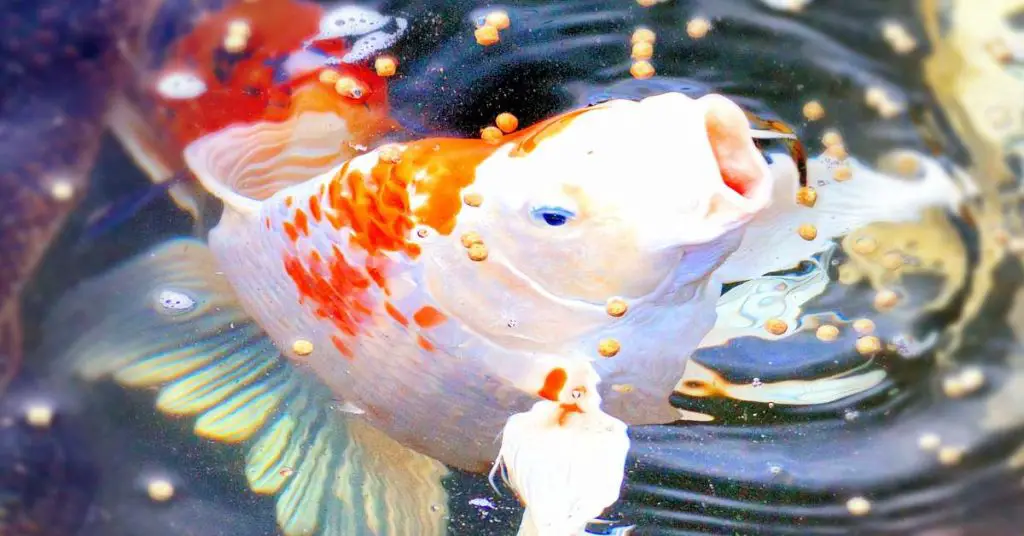
If you want to keep your Koi fish happy and healthy, providing a balanced diet is crucial. Replicating their natural diet in captivity is essential for their overall well-being. So, here are some tips to help you select the appropriate food for your pet koi fish.
Commercial koi fish food options
One convenient way to ensure your koi fish get a well-rounded diet is by opting for commercial koi fish food. These specially formulated pellets are designed to meet the specific nutritional needs of koi fish. Plus, they come in different sizes, making it suitable for koi fish of all ages and sizes.
When choosing a commercial fish food, look for options that contain a good balance of protein, fats, and carbohydrates. You want to provide a diverse range of nutrients to support their growth, coloration, and overall health.
Supplementing with natural food sources
In addition to commercial food, it’s beneficial to supplement your koi fish’s diet with natural food sources. This helps recreate their natural feeding behaviors and gives them a wider variety of nutrients.
A great natural food source for koi fish is live or frozen insects and small invertebrates. You can find options like bloodworms, daphnia, and brine shrimp at pet stores or online. These provide essential proteins and vitamins that mimic what koi fish would consume in the wild.
Another way to supplement their diet is by offering them a variety of aquatic plants. You can include options like lettuce, water hyacinth, and watercress. These plants offer valuable nutrients, fiber, and help promote good digestion in your koi fish.
Remember, variety is key. By incorporating a mixture of commercial food and natural food sources, you can ensure your koi fish receive a well-balanced diet. This will not only keep them healthy but also enhance their coloration and vitality.
Potential challenges in providing a natural diet for koi fish
Providing a natural diet for koi fish in captivity or outdoor environments may come with its own set of challenges. While it is important to replicate their natural diet as closely as possible, there are a few factors to consider.
Availability and accessibility of natural food sources
One of the challenges in providing a natural diet for koi fish is the availability and accessibility of the required natural food sources. In the wild, koi fish have a wide range of food options, including aquatic plants, insects, and small fish. However, finding all these food sources in ample quantities can be difficult, especially in a controlled environment like a pond.
In some cases, certain aquatic plants or insects may not be readily available or easy to find. This can pose a challenge when trying to provide a diverse range of food options for the koi fish. It may require some effort and research to find suppliers or sources that can provide these natural food sources on a regular basis.
Considerations for pond or outdoor environments
Another challenge when it comes to providing a natural diet for koi fish relates to the specific environment they are in. For ponds or outdoor settings, factors such as weather, water quality, and other pond inhabitants need to be taken into account.
For example, during certain seasons, the availability of specific food sources may fluctuate. In colder climates, insects and small fish populations may decrease during winter months, making it more challenging to provide a varied and natural diet for the koi fish.
Additionally, the presence of other fish or organisms in the pond can also affect the availability and accessibility of certain food sources. Competition for food may arise, which can make it difficult for the koi fish to obtain the natural diet they require.
Overall, while there may be challenges in providing a natural diet for koi fish, it is important to keep their dietary needs in mind and make efforts to replicate their natural diet as closely as possible. This can help maintain the overall health and well-being of the koi fish in captivity or outdoor environments.
Conclusion
As omnivorous creatures, Koi rely on a balanced diet to thrive. In their native environment, koi fish feed on aquatic plants and algae, insects and small invertebrates, as well as small fish and their eggs.
Aquatic plants play a crucial role in their diet, providing them with essential nutrients. Common plants consumed by koi fish include water lettuce, water hyacinth, and duckweed. These plants are rich in vitamins and minerals that contribute to their overall health and vitality.
Insects and small invertebrates also make up a significant part of their natural diet. Koi fish enjoy feasting on mosquito larvae, water beetles, and dragonfly nymphs, which provide them with additional protein and essential fats.
Furthermore, small fish and their eggs are an important food source for koi fish. Species such as minnows and guppies are commonly consumed, offering nutritional benefits that contribute to the development and growth of koi fish.
When keeping koi fish in captivity or outdoor environments, it is crucial to replicate their natural diet. This can be achieved by selecting appropriate commercial koi fish food options that contain a balance of nutrients. Supplementing their diet with natural food sources, like aquatic plants and insects, can also provide additional enrichment.
However, providing a natural diet for koi fish may present challenges, such as the availability and accessibility of natural food sources. It is important to consider these factors when creating a suitable environment for them.
In summary, by understanding and providing a natural diet for koi fish, we can ensure their well-being and promote their vibrant colors and overall health. A balanced diet, including aquatic plants, insects, and small fish, is key to keeping these fascinating creatures thriving in our ponds or outdoor environments.
Key Takeaways:
- Koi fish have a natural diet in their native environment.
- They are omnivorous creatures, consuming a variety of food sources.
- Aquatic plants, insects, and small fish are important components of their diet.
- A balanced diet is crucial for their overall health and well-being.
- Koi fish feed on a variety of aquatic plants, such as water lettuce and duckweed.
- Insects like mosquito larvae and small fish species are also part of their diet.
- Replicating their natural diet in captivity can be achieved through appropriate food selection and supplementation.
- Availability and accessibility of natural food sources may pose challenges.
- A natural diet promotes vibrant colors and overall health in koi fish.
Related Questions
Can koi fish eat human food?
Yes, koi fish can eat some human food, but it’s important to be careful about what you feed them. While koi fish can consume small portions of fruits and vegetables like peas, lettuce, and watermelon, it’s crucial to avoid feeding them processed or high-fat foods. These can harm their digestive system and overall health. It’s best to provide a balanced diet specifically formulated for koi fish to ensure they receive all the necessary nutrients.
Can koi fish eat bread?
While bread is often fed to fish in ponds and lakes, it’s not an appropriate food for koi fish. Bread lacks the necessary nutrients for their diet and can cause digestive issues, such as bloating and constipation. Feeding bread to koi fish can also lead to poor water quality and may attract pests like ducks. It’s important to provide a proper diet consisting of commercial koi fish food and natural food sources to ensure their optimal health.
